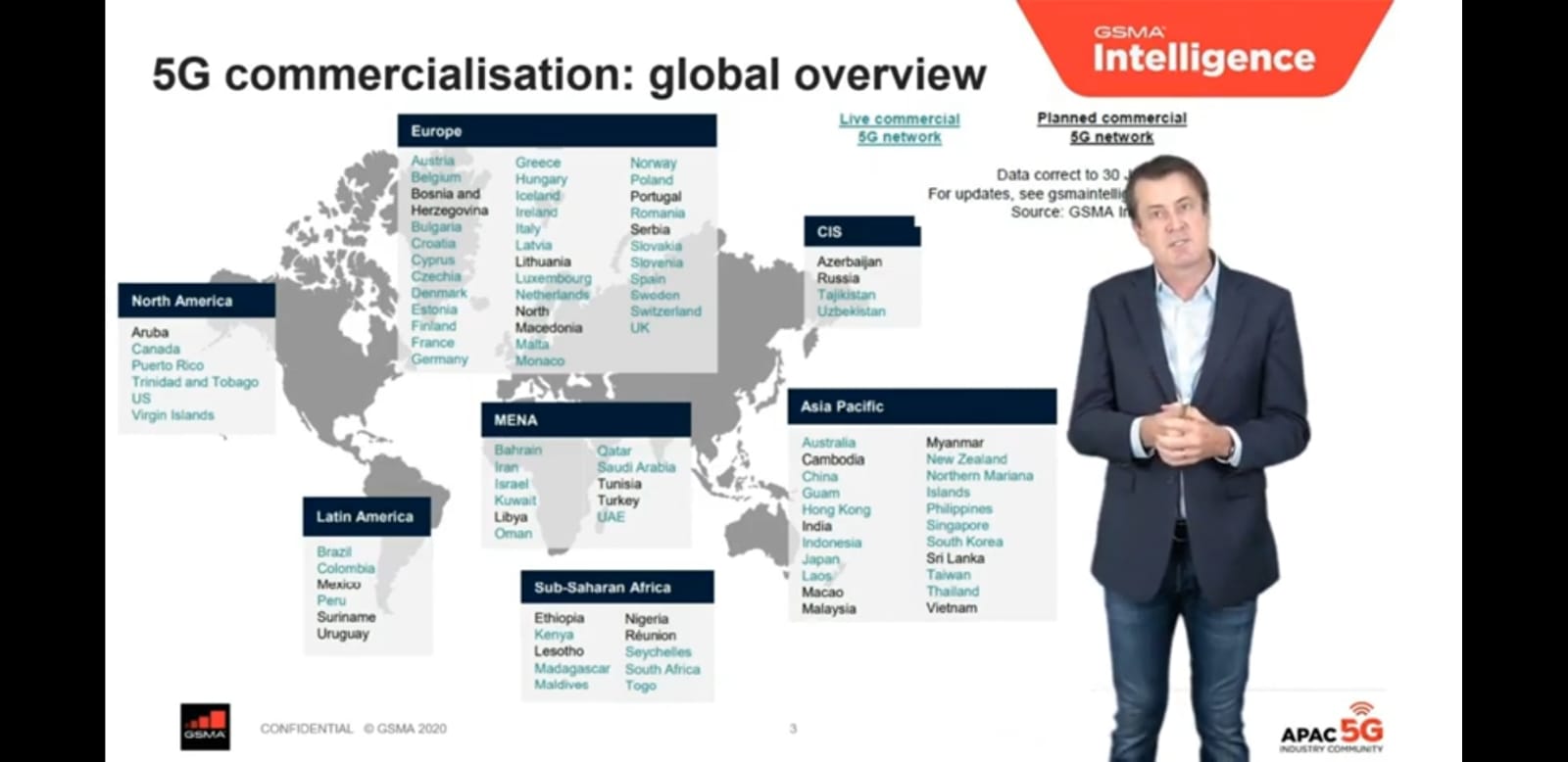Pakistan Not on GSMA 5G Growth Roadmap?
The 5G Technology Readiness and Commercialization market is predicted to expand at a rapid pace from 2021 to 2026. In 2021, the 5G market is rising at a steady pace along with the rising adoption of new strategies by key players. However, taking into account the influence of COVID-19 and economies on the global 5G Readiness and Commercialization market, it has stagnated its growth, particularly in developing nations such as Pakistan. The policymakers in Pakistan certainly need to go beyond talk to uplift its 5G commercialization and readiness. Unfortunately, Pakistan is estimated to be at the lowest end regarding smartphone usage as well the 5G coverage even among the selected countries of the Asia Pacific region by 2025.
As clearly depicted in the afore-mentioned image, the GSMA hasn’t included Pakistan in the 5G commercialization roadmap. The global organization considers Pakistan’s progress as pretty slow as compared to other countries of the Asia-Pacific and set it aside from the Roadmap. Why Pakistan Lags Behind? This isn’t a good sign for the Digital growth of Pakistan. It would be important to mention some causes behind the country’s poor progress along with some recommendations which can speed up the 5G technology readiness and commercialization. Slow Digital growth: Pakistan’s mobile market has tremendous potential, however, the contemporary levels of mobile internet adoption, smartphone penetration, and usage of digital services are far behind if we compare it with the other countries of the Asia-Pacific. Spectrum Scarcity: The Government has been seeing spectrum as a means to generate money through auctions. This runs contrary to the government’s vision of making available mobile broadband services across the country at an affordable price. Rather, the high expectation in a depressed economy and lack of vision to see realities has resulted in the recent failure to auction the available 4G Spectrum. The high cost of base price from the Government has pushed all mobile operators to abstain from the auction and keep a distance from acquiring Spectrum that could otherwise have been a step in the right direction if they have kept the price of the Spectrum at an affordable range. The Government will need to make bold decisions regarding spectrum allocation and availability if it wants to roll-out MBB services in the country. Continued 2G Reliance:
According to the telecom October 2021 Indicators of Pakistan Telecom Authority (PTA), there are about 106 million 3G/4G subscribers that make 48.19 % penetration in the country with the total broadband subscription only 108 million. On the other hand, the total number of cellular subscribers stood at 187 million. The majority of cellular subscribers continues to rely on 2G services. It is a cause of major concern as 5G deployment needs universal expansion of LTE services and convert its 2G population to mobile broadband services. Illegal Use of Services: Adoption of 5G technology in Pakistan will also require the shutting down of the unlawful use of wireless services that causes signal degradation. For example, similar to Electricity transmission where capacity suffer losses because of power thefts, similar is the case with cellular signals. Several cellular and broadband users in Pakistan have reportedly been experiencing drop in their mobile network signals because of a rising trend of unauthorized installation of GSM signal boosters and other interferences. Tax Uncertainty: According to the experts, markets with more eminent tax uncertainty score lower on 5G infrastructure provision while a balanced approach of collecting revenues through the tax net potential in order to create favorable conditions for investment in 5G infrastructure and improve affordability. Contrarily, in Pakistan taxation is at the highest as compared to the other countries of the region.
What can be done?
New Spectrums Required: We surely need some new spectrum as it will provide the telecom operators with much greater bandwidth along with an increase in signal capacity. We can take the example of the European Union, which is now releasing up to 400 MHz bandwidth on a 3.5 GHz spectrum. However, in the case of Pakistan, a bulk release of spectrum has to come at an affordable price so that mobile operators investments doesn’t go into spectrum but is available for rolling out infrastructure. An evolutionary Approach: Several attributes of the 5G technology are constituted on 4G networks, rather than a complete departure from the previous generations. It implies that telecom operators can stick to an evolutionary approach towards 5G infrastructure investment. For instance, the operators could begin by upgrading the capacity of their existing 4G network by reallocating their 2G and 3G spectrum, or by acquiring an additional spectrum when it is made available at an affordable price. More Investment for Setting up the 5G local infrastructure: The cost and investments related to 5G technology, will vary over time and it also depends upon domestic conditions. As we have to import most of the infrastructure which includes telecom equipment, therefore, it can prove to be more costly for us as compared to those countries who manufacture this equipment domestically. Keeping that in mind, the government and telecom operators have a couple of options. The first incorporates a lean-in strategy in which they give preference to 5G investments to speed up commercial 5G projects. The other one encompasses a conservative approach in which they delay 5G investments as long as possible while existing cellular and broadband networks are updated. Improving Transmission Capabilities: The transmission also plays a pivotal role in the deployment of 5G technology. So, for this purpose, Fiber-only transmission will become the key. In order to improve the transmission lines, telecom mobile operators will have to undertake full-scale fiberization efforts. The fiberization is also mandatory for supporting small-cell deployment in urban areas. One thing that is worth mentioning here is that the fiberization process will increase the investment cost, which the authorities must keep in mind. Check out? Vivo V23e 5G Will Be Released in Asia Next Week, Expected to Arrive Pakistan Soon

